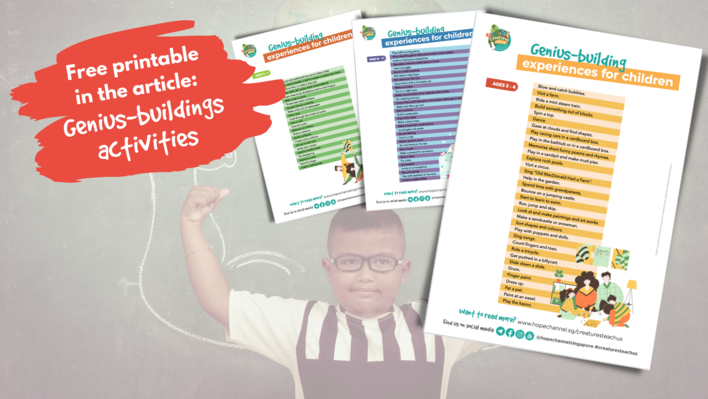One psychologist has the secret to finding your child’s strengths, unleashing their innate potential and a free printable to encourage their inner genius. (Free printable at the end of this article)
If you watched SBS documentary series Child Genius last year, you would be led to believe the word genius describes only a gifted few. How many children do you know can spell sesquipedalian or otolaryngology—or even know what they mean?
However, Melbourne-based clinical psychologist Dr Andrew Fuller wants to challenge our modern understanding of the concept. Specialising in brains, learning and resilience, he works “to create with people futures they can fall in love with”.
Your child’s strengths may not be what you expect
In contrast to popular perception, Dr Andrew believes that everyone possesses genius—that is, natural talent—in different areas. His vision is for every child to have their individual strengths acknowledged and developed by the adults around them. A meaningful life comes from knowing who we are and what we’re here for—we need to have a sense that we and our unique contribution to the world are truly valued.
Dr Andrew has a passion for young people and helps families, schools and communities to become places where every child has the opportunity to reach their full potential. He has seen firsthand what happens when children’s strengths aren’t acknowledged.
“It’s a recipe for disaster,” he says. “They feel locked into other people’s expectations, especially their parents’, and can sometimes become anxious and depressed.”
According to Dr Andrew, our modern schooling system makes the situation worse, because it ranks children based exclusively on their capacity in two areas: literacy and numeracy. “Some children feel like miserable failures because their strengths in other areas, such as music or sport, are not measured or acknowledged.”
While schools and teachers have their part to play, it’s parents who are best placed to draw out a child’s true potential—and all it takes is to spend time talking to them.
How to find your child’s strengths
In his latest book, Unlocking Your Child’s Genius: How to Discover and Encourage Your Child’s Natural Talents, Dr Andrew writes, “The power of parents to ignite the blaze of brilliance becomes truly inspiring. Fortunately you have at your fingertips the best laboratory for unlocking your child’s genius—it’s called the world. By exploring, creating and playing in it, you can expand your child’s mind. By taking time with them to delight and wonder and be curious, you ignite sparks that will flicker and flourish throughout their lives. What a gift to give.”
The first step, according to Dr Andrew, is to get to know your child and identify their learning strengths. As parents, we will have to continue learning and “re-learning” about our children as they move through each new age and stage. Genius is not just about excelling in maths or spelling—Dr Andrew has identified 10 different kinds of “smart” (read on to find out what they are). Every person possesses these learning strengths in differing proportions.
For school-aged children, it’s important to share what we learn about our children with their teachers. In Dr Andrew’s words, “The adults in a child’s life should collaborate and agree on a process to get the best outcome for the child.”
When we have more than one child, Dr Andrew says it’s easy to fall into the trap of pushing our children towards different roles in the family. We label one child “the artistic one” and another “the mathematical one”. Dr Andrew cautions against this kind of pigeon-holing, because it blinds us to the ways that our children’s learning strengths may actually overlap. His advice is simple: “Take each child as they are.”
How to encourage your child’s strengths
Once we have mapped out our children’s learning strengths, it’s time to take them out into what Dr Andrew calls the “classroom of life”. This is important, he says, because today’s children are “information rich, but experience poor”. Parents can encourage their children’s natural curiosity by doing things together. Every chapter of Dr Andrew’s book ends with a list of enriching experiences for kids of every age. Even the simplest activities provide opportunities for our children to explore the world.
Depending on their age, these could include (Read one for a more extensive list of activities to develop your child’s strengths):
- Use all of the senses: encourage kids to touch, smell, see, hear and even taste a variety of things.
- Read to them and with them.
- Teach them to identify the letters of the alphabet, to tell the time, learn to count, draw circles and counter clockwise circles (important for writing); sing the alphabet and times tables with them.
- Remind children that their brain is like a muscle that can get stronger and smarter as they use it.
- Get them excited about learning. Help them to investigate ideas, plan and complete projects, and conduct experiments.
- As well as continuing to photograph your child doing things, hand the camera over to them and ask them to take photographs or make short videos.
According to Dr Andrew, parents are their children’s “neuroarchitects”—that is, we can have a real impact on how our children’s minds develop. Unlocking Your Child’s Genius shows parents how to encourage the essential “genius” skills: concentrating, persevering, learning new things, analysing and organising information, and remembering what you learn.
It is also important to establish family routines that support our children’s healthy development. This includes making time for rest and sleep, exercise and meaningful conversations; it includes providing healthy food and limiting screen time. Parents are their children’s most important teachers and role models, so what should we model?
“Firstly, show your children that learning is great fun. Keep up your own curiosity about the world; delight in telling interesting stories and seeing the absurdities of life,” Dr Andrew suggests.
“Secondly, model making mistakes. Kids need to know that mistakes are just what happens on the path to learning. Children can learn from us how to critique their experiences. Ask them, ‘How would you do things differently next time?’ Or ‘What did you do to make that a success?’
“Finally, be prepared to be amazed by your kids. And point out to them what amazes you. When you acknowledge what your children are doing well, it gives them a real lift.”
Dr Andrew is inspiring a new generation of parents to release the spark of genius in their children. As he writes in his book, “Your child’s genius will only be unlocked when you take the time to plan, enrich, explore and help them discover their spark. In a world that requires children to study more and play less, we need to help them play more, reflect, consider and analyse more—and, most of all, dream bigger dreams.”
The 10 different kinds of “smart” (or a list of your child’s strengths)
(Source: Unlocking Your Child’s Genius by Andrew Fuller is available at badapplepress.com.au)
1. Number smart
Working with mathematics, numbers and calculations
2. Word smart
Reading, writing and spelling
3. Logic smart
Thinking issues through and clearly coming to a conclusion
4. Picture smart
Art, design, construction and mechanics
5. Technology smart
Computers, using tools to create things and video-making
6. Body smart
Fitness, health, strength, healing and acting
7. Nature smart
Farming, caring for animals and looking after the environment
8. Music smart
Playing, creating, listening to music and singing
9. People smart
Understanding others, creating friendships, resolving differences, managing, inspiring and connecting with other people
10. Self smart
Perhaps the most important smart of all: knowing yourself, your likes, dislikes, your areas of strength and interests
Free Printable: Download and print this printable for a list of kids’ activities you can do to encourage their strengths. Suitable for kids aged 2-4, 5-7 and 8–11.
This article is adapted with permission, from a version that was first published on Mums At The Table.
Harriet Connor
Harriet Connor lives with her husband and three sons on the Central Coast of NSW. She is the author of Big Picture Parents: Ancient Wisdom for Modern Life and has degrees in Languages and Theology.



